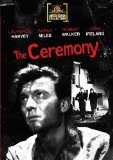| Reviews & Columns |
|
Reviews DVD TV on DVD Blu-ray 4K UHD International DVDs In Theaters Reviews by Studio Video Games Features Collector Series DVDs Easter Egg Database Interviews DVD Talk Radio Feature Articles Columns Anime Talk DVD Savant Horror DVDs The M.O.D. Squad Art House HD Talk Silent DVD
|
DVD Talk Forum |
|
|
| Resources |
|
DVD Price Search Customer Service #'s RCE Info Links |
|
Columns
|
|
|
Ceremony (1963), The
Pretentious, I suppose, and talky at times certainly...but visually exciting and in the end, its allegorical message works. M-G-M, through their increasingly interesting M.O.D. ("manufacture on demand") Limited Edition Collection (now distributed online through Warner's own M.O.D. service, the Archive Collection), has released The Ceremony, the 1963 United Artists drama produced and directed by star Laurence Harvey, with Sarah Miles, Robert Walker, Jr., John Ireland, Ross Martin, and Jack MacGowran lending solid assistance. With a screenplay by Ben Barzman (based on Frédéric Grendel's novel), and striking cinematography from the master, Oswald Morris, Harvey has some heavyweight support in his first directorial effort, giving The Ceremony some welcome heft.
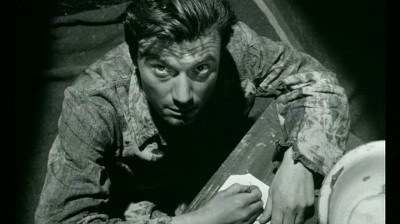
Tangier, at a prison in the international zone. Death awaits recalcitrant bank robber Sean McKenna (Laurence Harvey), who has steadfastly refused to either return the stolen money or finger the cohort who murdered a bank guard―either of which would have commuted his death sentence. The prison warden (John Ireland) begs Sean to give up the information, as does international observer Sanchez (Fernando Rey), both of whom feel that a firing squad is too harsh a judgment for the crime. Tangier native and ruthless politician Le Caq (Ross Martin), however, feels an execution is just what Tangier needs to prove to the world that it's not a home for thieves and smugglers and murderers; he wants Sean dead, regardless of whether or not "justice" is served. Delivery won't come from the Lord, either, for cynical non-believer Sean, who has repeatedly told Father O'Brian (Jack MacGowran) there is nothing after death. No, the only hope for temporary salvation for Sean will come from his brother, Dominic (Robert Walker, Jr.), his partner, Nicky (Lee Patterson), and Sean's girlfriend Catherine (Sarah Miles), who are planning a break-out for Sean right before "the ceremony" begins. What Sean doesn't know is that Dominic has only agreed to this plan...if he can have Catherine.
MAJOR PLOT SPOILERS
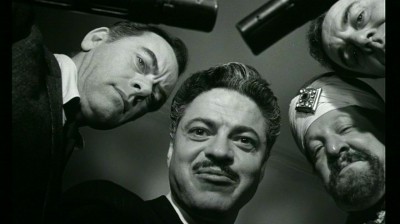
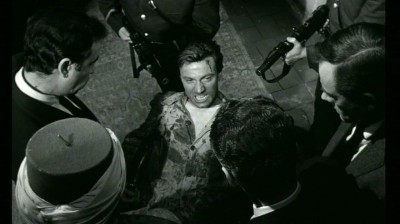
The Ceremony is one of those obscure but interesting-sounding titles you see pop up in a major star's filmography―ones that you assume you'll never actually get to see. After all, using Laurence Harvey as a convenient example, how many times have movies like The Alamo, BUtterfield 8 and of course, Room at the Top been shown over and over again on television, while titles like The Long and the Short and the Tall, The Spy with the Cold Nose, or indeed The Ceremony are nowhere to be found? When it was released in 1963, The Ceremony received largely negative-to-indifferent reviews, but seeing it here for the first time, I found it intriguing and well-performed, despite its pretensions (or maybe more accurately: because of them).
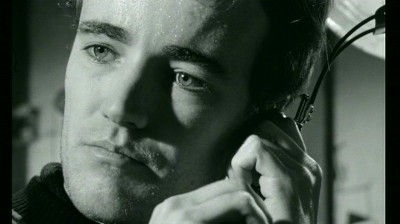
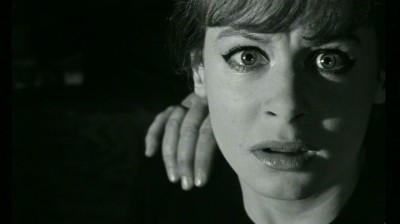
The Ceremony has a lot of shots of people staring off-center into the camera, declaring their confusion over various philosophical dilemmas, and often, the script by Ben Barzman (El Cid, The Fall of the Roman Empire, The Blue Max), as interpreted by director Harvey, raises far more questions than it answers. First and foremost, I would have liked more background on the Sean character. Until they see the general direction the movie is going in, some viewers may be forgiven in thinking that they sat down a half hour late into the picture. Without the benefit of seeing his original crime, or in experiencing the days-on-end rebellion he's waged against the international authorities, we're stuck as to why, exactly, the other prisoners in the jail are cheering so lustily for this bank robber when he announces to them that he's still there, and he hasn't talked, even though he's to be shot that night. We "get it" intellectually, but we don't feel it the way we would had, had we more experience with the character. As is it, we join him already on death row, on the night of execution, and while that framework certainly adds tension to the planning and execution of the breakout, it makes the philosophizing a puzzling, sometimes tough slog.
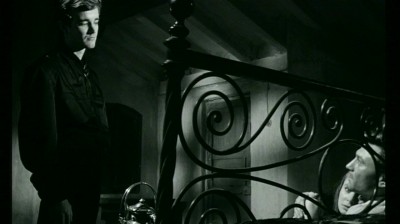
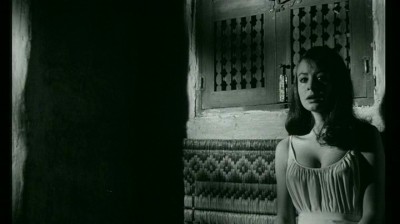
I also wasn't clear on exactly why Dominic wanted to take away his brother's girlfriend (which robbed the seduction scene between Miles and Walker of any perverse heat―something Miles did better than just about anyone in 1963), nor for that matter, exactly why he wanted to spare his brother by allowing the authorities to think he was Sean (spoiler: after Dominic brings out Sean, the brothers fall out and Dominic escapes...only to crash his car and burn horribly in the wreckage. The authorities believe it's Sean, and Dominic is brought back to the prison to be shot as "Sean."). If I knew more about their animosity, and more about why Dominic has a change of heart at the end, it might lend more true tragedy to the final denouement. I can see where the critics of the day found such "instant philosophizing" annoying from characters they didn't feel they really knew. That kind of psychological shorthand lends itself to some big leaps of ideological insight for the viewer, insights which they may not be willing to accept without proper grounding, such as the MacGowran priest character, who spends most of the film talking to himself and God as he worries over the soul of Sean, until he realizes―bam! ―that Sean is saved because "there's a little bit of God in all of us." Maybe that's true (this non-believer hopes so, at least), but the film makes it hard for us to accept that obvious messaging when the character is so clearly drawn as an instrument of pontification, not true dramatic exposition.
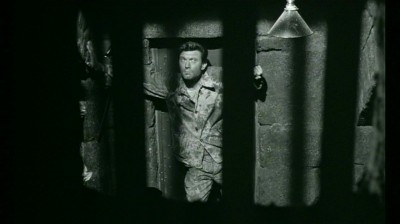
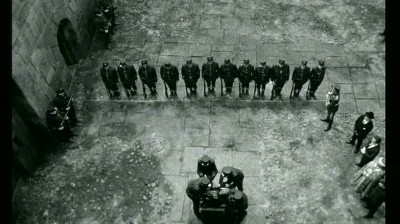
Still...The Ceremony at least tries to have something on its mind other than just executing another standard action/chase/betrayal prison picture. And regardless of how clumsy and obvious it can be in getting across those ideas, it's nevertheless quite affecting when it delivers its final sermon: the image of a reformed Sean, carrying the horrifically burned body of his brother Dominic, as he calls out to the prison: "This is my brother! He died for me!" I know it's an obvious allegory, and subtle it ain't, what with Morris' and Harvey's ultra-dramatic lighting and extreme overhead shots creating a surreal, expressionistic image (the shooting of Dominic is rather shocking and ghastly, too, for a 1963 film, bringing the viewer up short with the grotesquerie of the makeup job and the violence of the act). However, that very quality of going over the top here endeared The Ceremony to me. Yes, most of the exposition is obvious in its declarative insistence, but I found myself enjoying that pose, that artificial, arbitrary posturing for its own sake, with the finale entirely in keeping with that florid tone (perfectly matched by Morris' extreme close-ups and asymmetrical framing). I have no idea if the makers of The Ceremony actually believed their own message about redemption achieved by finding God within ourselves, nor did The Ceremony "convert" me...but it did satisfy, on a most basic level, the desire to see a story that was about something bigger than what it was nominally supposed to be. And it had the guts to be emphatic and garish and passionate about those ideas. I like that.
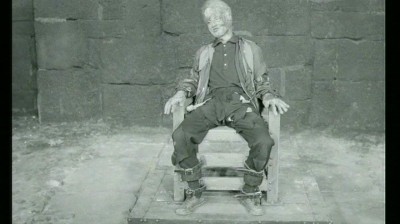
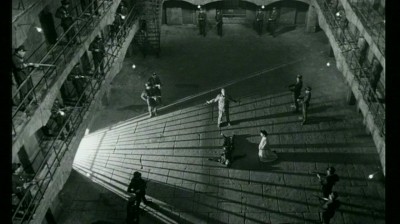
The DVD:
The Video:
The anamorphically-enhanced, 1.78:1 black and white widescreen image for The Ceremony's transfer, ignoring the expected instances of print damage here and there, looked quite good here, with blacks holding reasonably well, contrast acceptable, and grain within expectations for an unremastered transfer. Oswald Morris' cinematography is stunning, and this transfer gives a fair approximation of his talent.
The Audio:
The Dolby Digital English mono audio presentation was fat and clear, with minor hiss discernable. No subtitles or close-captions were available.
The Extras:
An original trailer―a nice touch for these extras-starved M.O.D.s―has been included for The Ceremony.
Final Thoughts:
Talky at times, and obvious...but also quite passionate and emphatic. Director Laurence Harvey gets a charged performance out of star Laurence Harvey, while cinematographer Oswald Morris gives you something to marvel at in each scene...regardless of whether or not the screenplay is working. If you don't go into The Ceremony expecting a standard action film, you may find it quite intriguing. I'm recommending The Ceremony.
Paul Mavis is an internationally published film and television historian, a member of the Online Film Critics Society, and the author of The Espionage Filmography.


|
| Popular Reviews |
| Sponsored Links |
|
|
| Sponsored Links |
|
|
| Release List | Reviews | Shop | Newsletter | Forum | DVD Giveaways | Blu-Ray | Advertise |
|
Copyright 2024 DVDTalk.com All Rights Reserved. Legal Info, Privacy Policy, Terms of Use,
Manage Preferences,
Your Privacy Choices | |||||||









